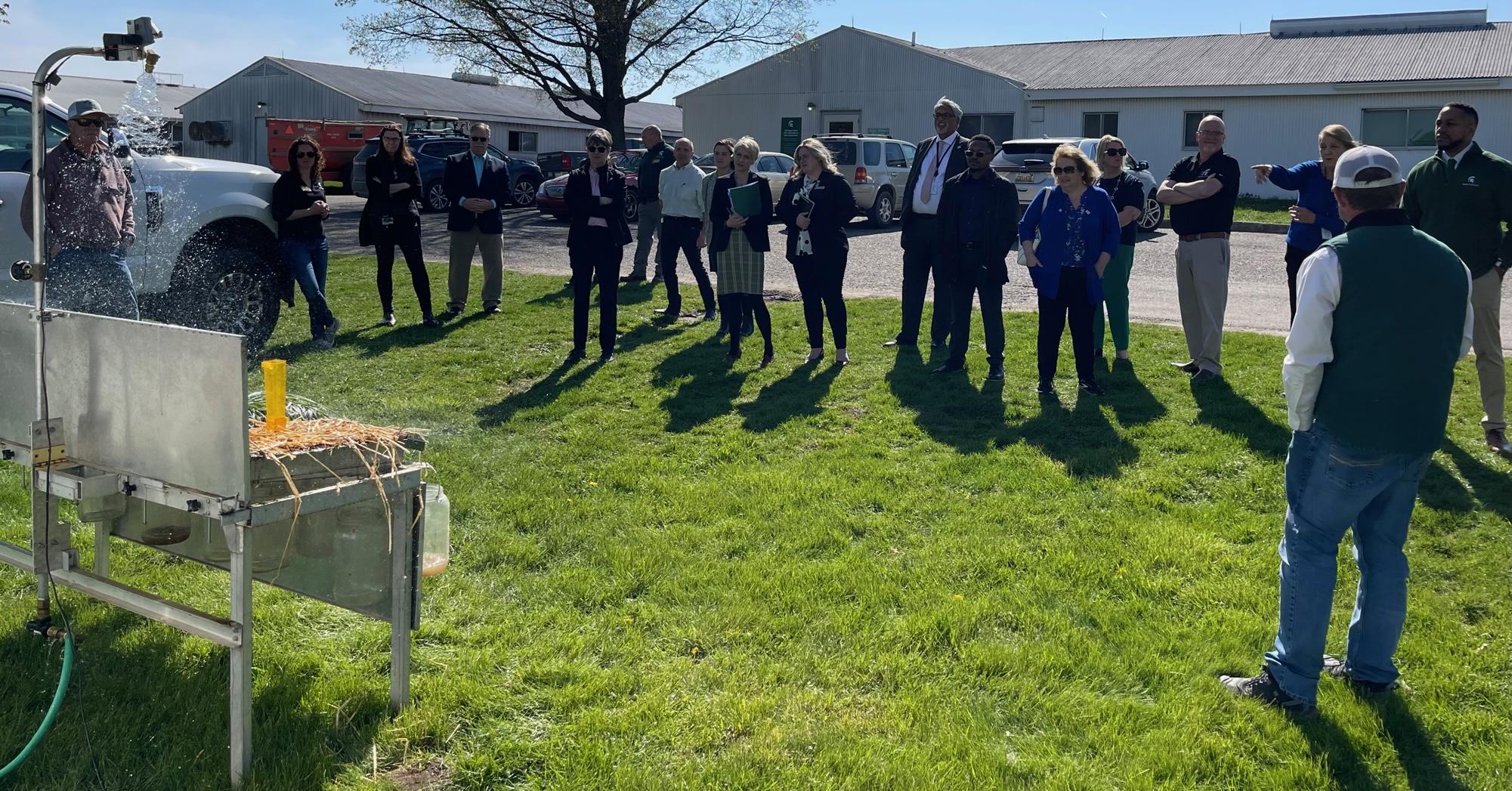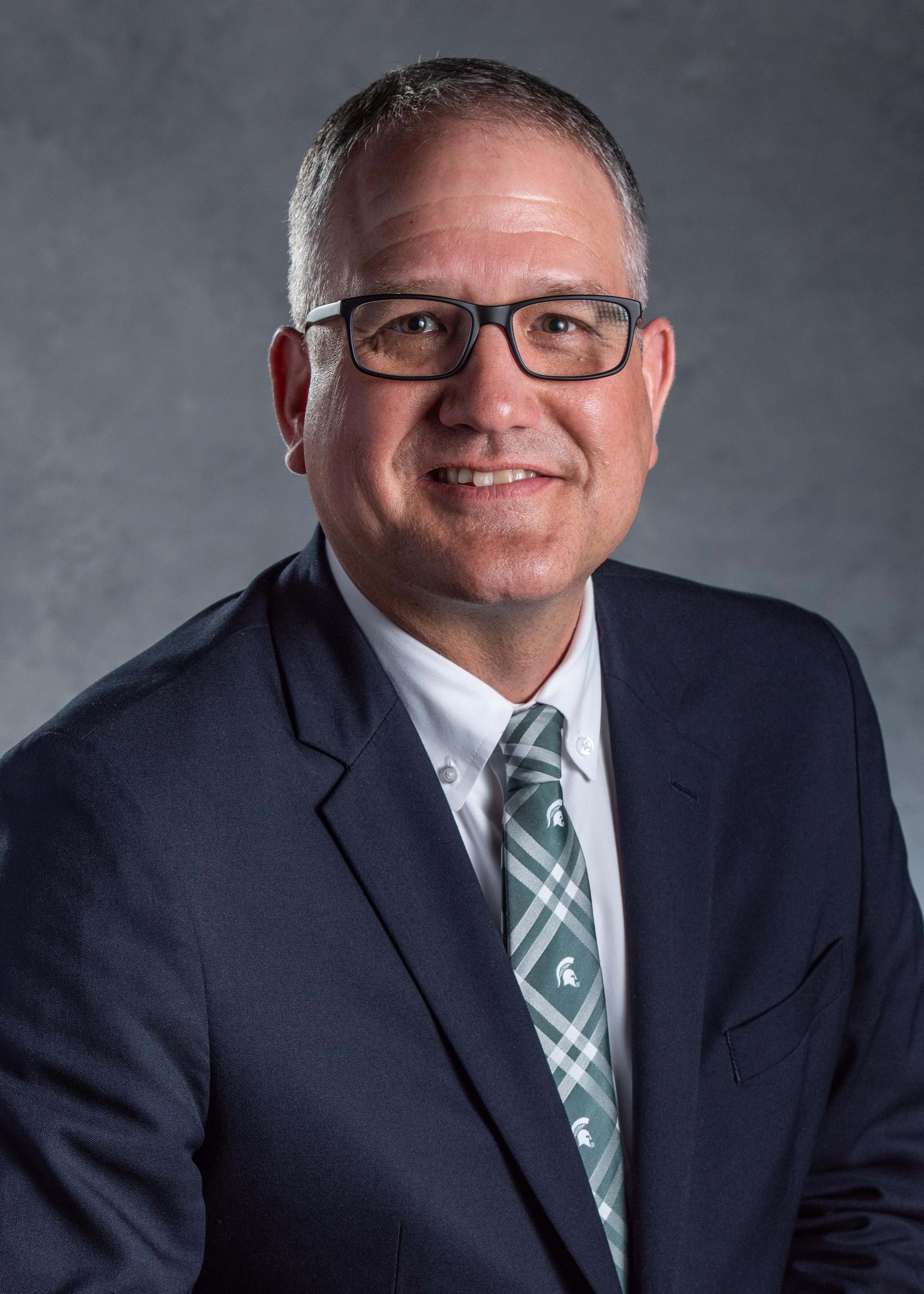MSU hosts legislators to showcase AgBioResearch, Extension programming
State legislators tour campus greenhouses, South Campus Animal Farms

EAST LANSING, Mich. – Michigan State University hosted Michigan lawmakers last week for a tour of College of Agriculture and Natural Resources farms and facilities, highlighting MSU AgBioResearch and MSU Extension faculty and programming.
Ten state legislators, along with their staff and guests, were informed of research and outreach efforts by MSU AgBioResearch Director George Smith, MSU Extension Director Quentin Tyler and CANR Director of Government and Stakeholder Relations Patrick Cudney. The guests saw firsthand the deteriorating conditions of the MSU Plant Sciences Greenhouse Complex and MSU South Campus Animal Farms, both facilities scheduled to be renovated and modernized in the coming months with funding from the state of Michigan.

In addition, CANR faculty highlighted some of the overarching efforts that support the success of Michigan’s agriculture and natural resources industries, while protecting the state’s ecosystems and environment.
“As legislators, we are put in the position to make a lot of decisions that impact huge cross-sections of communities and industries across our state,” said Rep. Julie Brixie, who serves as chairperson of the House Appropriations subcommittee on Agriculture and Rural Development and Natural Resources. “This visit is intended to provide information and build our knowledge of the impact agriculture has in Michigan, and the resources MSU provides to support the state’s agriculture and natural resources.”
Legislators on the tour are members of committees and subcommittees that deal directly with policy and decision making related to Michigan agriculture. Those in attendance were:
- Julie Brixie, Okemos
- Reggie Miller, Belleville
- Donavan McKinney, Detroit
- Denise Mentzer, Mt. Clemens
- Penelope Tsernoglou, East Lansing
- Rep Jerry Neyer, Shepherd
- Veronica Paiz, Harper Woods
- John Roth, Traverse City
- Emily Dievendorf, Lansing
- Sam Singh, East Lansing
Rep. Jerry Neyer, a first-time representative of Michigan’s 92nd House District said the visit was eye-opening and an excellent opportunity to learn the role MSU plays in supporting the agricultural industries of his district, which includes Mount Pleasant, Alma and Ithaca, and the state.
“It is a priority for me as a legislator, a dairy farmer, and a representative of agricultural communities, to be up to speed on the type of work MSU is doing to support agriculture across our state,” said Neyer, minority vice chair for the House Agriculture Committee. “It’s important for us to understand the impact MSU’s research and Extension programs are having and to continue to support MSU and the success of those programs.”
MSU faculty highlighted the impact and reach of programs covering a snapshot of the vast array of crops and commodities MSU supports. Michigan produces more than 300 commodities on a commercial basis. The food and agriculture industry contribute $104.7 billion annually to the state's economy and employs more than 800,000 workers.
MSU faculty presentations included Rufus Isaacs discussing berry crops entomology and berry crop pests; Addie Thompson’s maize research and Extension program; the impact of Partnerships for Ecosystem Research and Management (PERM); a soil runoff demonstration from MSU Center for Regenerative Agriculture Director Jason Rowntree; and a look at the future of MSU’s dairy research and veterinary programs with C.E. Meadows Endowed Chair in Dairy Management Barry Bradford; and chairperson of MSU’s Department of Large Animal Clinical Sciences Annette O’Connor.

The trip culminated in a visit to the Food Processing and Innovation Center for some MSU Dairy Store ice cream and a showcase of Michigan’s leading independent commercial food development, processing, packaging and research facility.
“Hosting our elected officials is a great opportunity for Michigan State University, MSU AgBioResearch and MSU Extension to highlight the impact its faculty has on farms and communities across Michigan,” Cudney said. “It is also a great responsibility we have as a public land-grant institution to provide evidence and context to the work we do and its relevance and application to the people of our state.”



 Print
Print Email
Email




